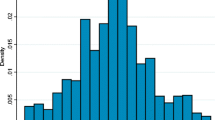Abstract
Communist Party membership can generate labor market benefits in at least two ways. First, the Party may hand out direct benefits to favored groups in the form of higher earnings. Alternatively, the Party may function in much the same way as education in Western countries, screening workers for talent and motivation. We find very little evidence of earnings premiums to Party membership or to cadre status prior to Chinese market liberalization. With liberalization comes less emphasis on being “red” and a greater capacity to earn wages that reflect ability, both observed through schooling and identified by the Party. We find that Party premiums are inversely related to education. Modest premiums to cadre status appear in 1995.
Similar content being viewed by others
References
Anderson, G. M., & Boettke, P. J. (1997). Soviet venality: A rent-seeking model of the Communist state. Public Choice, 93, 37–53.
Belova, E., & Gregory, P. (2002). Dictator, loyal, and opportunistic agents: The Soviet archives on creating the Soviet economic system. Public Choice, 113, 265–286.
Belova, E., & Lazarev, V. (2007). Why Party and how much? The Soviet State and the Party finance. Public Choice, 130, 437–456.
Bian, Y., Shu, X., & Logan, J. (2001). Communist Party membership and regime dynamics in China. Social Forces, 79, 805–842.
Cheung, S. N. (1998). Deng Xiaoping’s great transformation. Contemporary Economic Policy, 16, 125–135.
Communist Party of China National Congress (2002). Constitution of the Communist Party of China. Beijing Xinhua: New China News Agency (in English).
Geishecker, I., & Haisken-DeNew, J. P. (2004). Landing on all fours? Communist elites in post-Soviet Russia. Journal of Comparative Economics, 32, 700–719.
Gerber, T. P. (2000). Membership benefits or selection effects? Why former Communist Party members do better in post-Soviet Russia. Social Science Research, 29, 25–50.
Harasymiw, B. (1984). Political elite recruitment in the Soviet Union. New York: St. Martin’s.
Khan, A. R., & Riskin, C. (1999). Income distribution in urban China during the period of economic reform and globalization. American Economic Review, 89, 296–300.
Lam, K. J. (2003). Earnings advantage of Party members in urban China. BRC Working Papers, School of Business, Hong Kong Baptist University.
Lee, C. K. (1999). From organized dependence to disorganized despotism: Changing labour regimes in Chinese factories. The China Quarterly, 157, 44–71.
Li, B., & Walder, A. G. (2001). Career advancement as Party patronage: Sponsored mobility into the Chinese administrative elite, 1949–1996. American Journal of Sociology, 106(5), 1371–1408.
Li, H., Liu, P. W., Ma, N., & Zhang, J. (2007). Economic returns to Communist party membership: Evidence from urban Chinese twins. Economic Journal, 117(523), 1504–1520.
Liew, L. H. (1993). Rent-seeking and the two-track price system in China. Public Choice, 77, 359–376.
Morduch, J., & Sicular, T. (2000). Politics, growth, and inequality in rural China: Does it pay to join the Party?. Journal of Public Economics, 77, 331–356.
Nee, V. (1989). A theory of market transition: From redistribution to markets in China. American Sociological Review, 54, 663–681.
Riskin, C., Zhao, R., & Li, S. (2001). China’s retreat from equality: Income distribution and economic transition. Armonk, NY: M. E. Sharpe.
Schnytzer, A., & Susteric, J. (1998). Why join the Party in a one-Party state? Popularity versus political exchange. Public Choice, 94, 117–134.
Walder, A. G. (1995). Career mobility and the Communist political order. American Sociological Review, 60(3), 309–328.
Walder, A. G., Li, B., & Treiman, D. J. (2000). Politics and life chances in a state socialist regime: Dual career paths into urban Chinese elite, 1949–1996. American Sociological Review, 65, 191–209.
Wu, F. (1996). Changes in the structure of public housing provision in urban China. Urban Studies, 9, 1601–1627.
Author information
Authors and Affiliations
Corresponding author
Rights and permissions
About this article
Cite this article
Bishop, J.A., Liu, H. Liberalization and rent-seeking in China’s labor market. Public Choice 135, 151–164 (2008). https://doi.org/10.1007/s11127-007-9251-0
Received:
Accepted:
Published:
Issue Date:
DOI: https://doi.org/10.1007/s11127-007-9251-0




